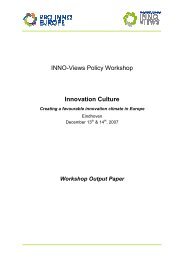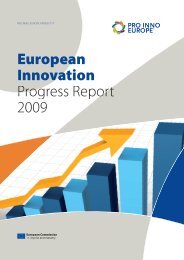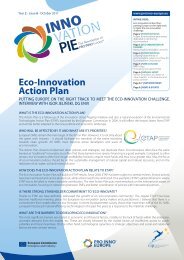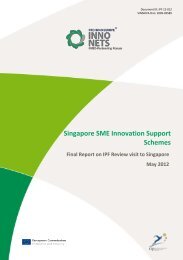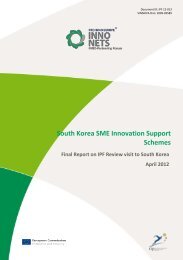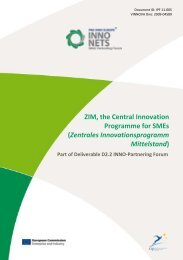Benchmarking National - PRO INNO Europe
Benchmarking National - PRO INNO Europe
Benchmarking National - PRO INNO Europe
Create successful ePaper yourself
Turn your PDF publications into a flip-book with our unique Google optimized e-Paper software.
why policy focuses on three dimensions to increase economic competitiveness:<br />
technological innovation, entrepreneurship and IP creation (the latter is considered<br />
to be linked to the first two dimensions) (Sathirakul, 2006). For the 2005 update of<br />
the Japanese IP strategy paper, a task force commissioned by the IPR Headquarters<br />
elaborated on measures to promote the intellectual property strategies of small and<br />
medium-sized companies. In total, the 2005 programme listed 450 support<br />
measures which address IPR usage and awareness in SMEs, in education, at<br />
universities and the general public (Sathirakul, 2006).<br />
Support services in place<br />
University-business collaboration (i.e., technology transfer) is a key cornerstone<br />
within the IP strategy. Its main vehicle is the system of Technology License Offices<br />
(TLOs). It is hoped, as far as the SME dimension is concerned, that through<br />
appropriating the IP of university research, start-up activities as well as out-licensing<br />
to existing SMEs will increase.<br />
The Japanese TLO system<br />
The Japanese Technology License Offices (TLOs) – which numbered 34<br />
(Nishizawa, 2007) as of the beginning of 2007 – have been born out of the<br />
necessity to boost the transfer of inventions from university to the industry<br />
profitably. The American TLO system – and its perceived success following the<br />
introduction of the U.S. Bayh-Dole Act in 1980. 23 – served as a role model in the<br />
design of its Japanese counterpart. The purpose of the TLOs is seen in<br />
commercialising inventions created in the universities: IP titles are transferred to<br />
the TLOs, which are organised as separate bodies and which license the<br />
technology out to industry; royalty dividends are received in return. In this<br />
respect, the Japanese TLOs are not that different from those encountered at<br />
<strong>Europe</strong>an universities. In addition, the TLO system aims to foster the creation of<br />
spin-offs from university which could be also considered a form of technology<br />
transfer and also adds a second and specific SME dimension to this type of<br />
service. The main incentive for researchers to support a Bayh-Dole Act system lies<br />
in the professional management of the IP which creates additional income for the<br />
university and for the inventors.<br />
Hence, the professional management of the IP is the key success factor, and<br />
several measures have been taken to secure success: First, the factor “human<br />
resources” is recognised to be of utmost importance. The aim is thus to attract<br />
able and experienced IP managers by providing them incentives, e.g., in the form<br />
of shares of royalty income. Second, it has also been decided that, after an initial<br />
period during which government funds are received, the TLO has to stand on its<br />
own feet and act like a private company. These two factors could be considered<br />
to constitute subtle differences from the operation of technology license offices<br />
in <strong>Europe</strong> and they could make a huge impact in terms of the effectiveness and<br />
efficiency of such institutions.<br />
23 The Bayh-Dole Act denotes a piece of U.S. legislation. Among others, it tackles the ownership of IP rights emerging<br />
from government-funded research; with respect to small businesses, non-profit organisations, and university. It states<br />
that such IP belongs to the entity carrying out the research, not the individual researchers.<br />
101<br />
TOWARDS GOOD PRACTICES – THE REAL WORLD OF IPR SUPPORT SERVICES






